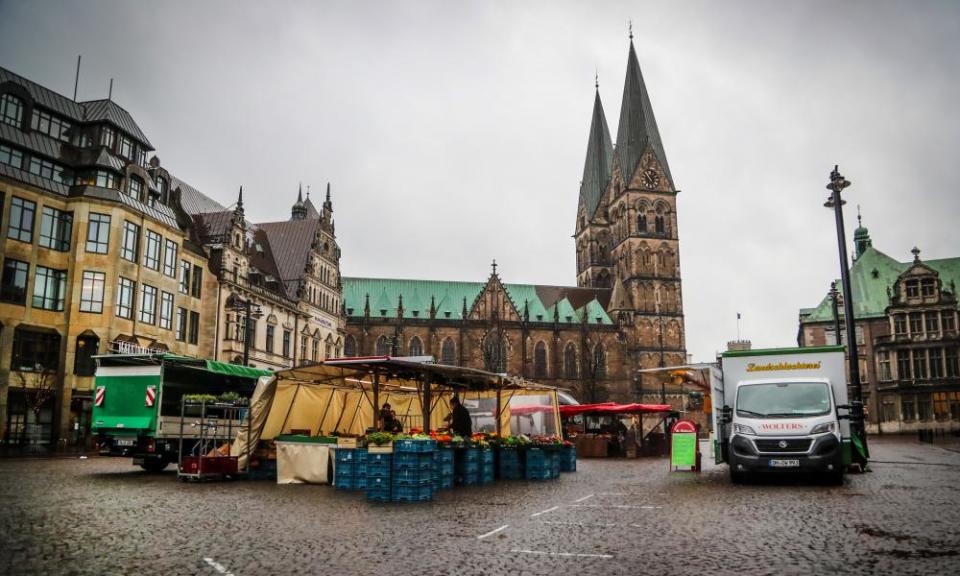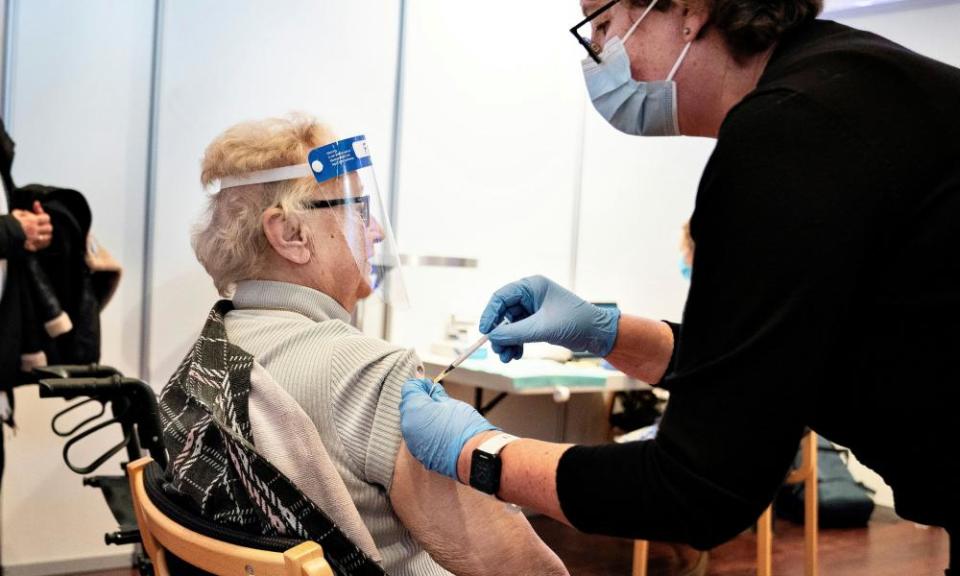Germany extends Covid lockdown amid concern over variants in Europe

Germany has extended and tightened its national lockdown despite slowly declining case numbers and the Netherlands and Denmark are expected to follow suit as concern mounts about new, more contagious variants of Covid-19.
The chancellor, Angela Merkel, and leaders of Germany’s 16 states agreed to extend the country’s lockdown on Tuesday until 14 February, with new rules also making it mandatory to wear medical masks in shops and on public transport.
Variants first seen in the UK and South Africa risked reversing a recent downward trend in infection numbers, said Merkel’s spokesman, Steffen Seibert.
In a digital summit, the German leaders agreed to carry over current restrictions introduced in November, when restaurants and leisure and sporting facilities were closed, with schools and non-essential shops following in mid-December.
A new rule will ban people from wearing homemade cloth masks or scarves as face coverings in shops and on trains and buses, instead mandating the use of “clinical masks” including single-use surgical masks as well as filtering facepiece respirators, known as FFP2 masks in Europe.
Denmark may also have to extend its lockdown measures beyond early February – despite a fall in infections – because of the British variant, the prime minister said on Tuesday.
The government already extended the lockdown for three more weeks last week, saying it expected the variant to be the dominant strain by mid-February. “If we don’t contain the pressure, we may risk an exponential increase in infections,” Mette Frederiksen said.
Under Denmark’s current measures, restaurants, bars and non-essential shops are closed and public gatherings limited to five people.

The Dutch government, which resigned last week but is staying on in a caretaker capacity until elections planned for mid-March, said it would announce new measures on Wednesday amid media speculation that it planned to announce a curfew and further localised restrictions.
The French health minister, Olivier Véran, said the virus was still circulating at a “worrying” level but stopped short of recommending a third national lockdown, saying France’s nationwide 6pm curfew was sufficient for now.
In Spain, Valencia – which like the rest of the country has been under a state of emergency since the end of October and subject to an overnight curfew – became the latest region to announce tougher action amid a surge in Covid cases. Spain reported a record rise in infections over the weekend.
Last week, Galicia banned all non-essential travel in the seven largest cities, ordered bars and restaurants to close at 4pm, and brought forward a curfew to 10pm. La Rioja closed non-essential businesses at 5pm and limited group meetings to four people, while shops in Cantabria were banned from opening at weekends.
As EU nations struggle to roll out their vaccination programmes, Letizia Moratti, the health chief of the wealthy northern region of Lombardy, sparked outrage by suggesting vaccines should be allocated to regions based partly on productivity in an effort to aid national economic recovery.
The health minister, Roberto Speranza, quickly dismissed the idea, saying everybody had a right to be vaccinated “regardless of the wealth of the place where they live” and health was a constitutionally guaranteed public good, not a privilege.
As Russia said its second vaccine, a candidate shot known as EpiVacCorona, was “100% effective” in early stage trials, the European commission announced a proposed timetable for vaccinations across the bloc’s 27 member states.
At least 80% of those aged over 80 will be given a jab by March 2021, as will 80% of health and social care professionals, it said, with 70% of the entire adult population vaccinated by the end of the summer.
In a thinly-veiled reference to the UK’s vaccination programme, the commission’s vice-president, Margaritis Schinas, said the pace of rolling out jabs should increase but that it was “not a race between countries but a race against time”.
default
Schinas also said the EU’s member states would agree by the end of the month on the form of a common vaccination certificate, but there were no plans to give travel rights to holders of such documents.
The paperwork will instead be used to ensure pan-European recognition of citizens’ vaccination records, although other possible uses will be debated by the bloc’s leaders at a virtual summit on Thursday.
Schinas said the use of the certificates as a passport – eagerly awaited by countries such as Greece and Spain – was “imaginable”, but only once enough people had been covered and agreement was found between all the capitals on the conditions of use.
An independent panel reviewing the World Health Organization (WHO) and the global response to the pandemic concluded the WHO was underpowered and underfunded and must be reformed to give it the resources to be more effective.
“We are not here to assign blame, but to make concrete recommendations to help the world respond faster and better in future,” the panel’s co-chair, Ellen Johnson Sirleaf, said on Tuesday, a day after its interim report was issued.

 Yahoo Finance
Yahoo Finance 